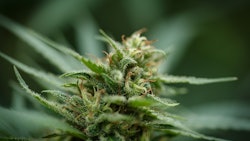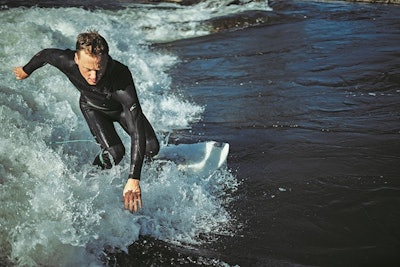
Ten years ago, American swimmer Michael Phelps dominated the 2008 Beijing Olympics, capturing a record eight gold medals. His performance made him one of the world’s most famous athletes. What happened next made him one of the most infamous. A photo of Phelps smoking from a bong surfaced Feb. 1, 2009, followed by worldwide criticism and a three-month suspension levied by USA Swimming, the sport’s national governing body.
“We decided to send a strong message to Michael because he disappointed so many people, particularly the hundreds of thousands of USA Swimming member kids who look up to him as a role model and a hero,” USA Swimming said in a statement at the time.

The message was clear and reaffirmed a traditional, archaic belief: Cannabis has no place in sports—never mind the fact that one of the greatest Olympians of all time consumed it. After all, cannabis is banned in all of America’s major sports leagues and appears on the World Anti-Doping Agency’s and U.S. Anti-Doping Agency’s list of banned substances.
The cannabis industry, however, is anything but traditional. So when Chrissy Hadar started seeing her Oregon dispensary fill with customers decked out in athletic attire, a light bulb went on.
“We were seeing people coming into our store after a long day on the mountain, or after suffering a mountain biking injury, looking for alternative treatments for pain or athletic recovery,” Hadar says. “So, we put our brains together, and we realized there was something there.”
Hadar is the co-founder (along with her husband, Aviv) and vice president of retail and branding of Oregrown, a vertically integrated, medical and adult-use dispensary in Bend, Ore. Hadar’s mission since opening Oregrown in 2013 has been to distinguish her craft-cannabis company from the state’s plethora of dispensaries. She’s gone about it in a unique way: Oregrown doesn’t market itself as a cannabis brand, specifically, but rather a lifestyle brand that promotes activity and health.
“When [people] think of Oregon, they think of a particular lifestyle. It’s connected to the environment. It’s connected to the outdoors. … Bend is a hub for extreme sports: mountain biking, climbing, white-water rafting, snowboarding, skiing,” Hadar says. “So, that’s what the Oregrown brand represents.”
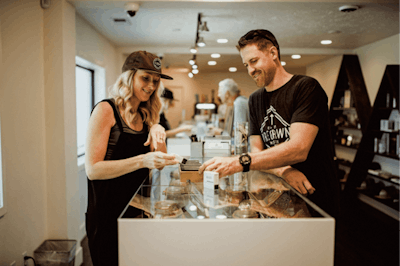
And what better way to market that lifestyle than with athletes who are living it? In 2017, Oregrown began sponsoring professional athletes to reflect the brand’s ethos and “destigmatize people’s stereotype of your average stoner.” Today, Oregrown sponsors 10 athletes across various sports such as snowboarding, mountain biking and climbing.
The Right Fit
Since Oregon—and Bend in particular—is an outdoor-activity utopia, Hadar only had to look to her backyard, and in some cases, her dispensary, to find athletes. All 10 Oregrown-sponsored athletes are local. “A lot of those athletes were already customers of our shop, or friends of people that worked at the shop,” Hadar says. “But they were also local legends.” This includes snowboarder Jonny Sischo, who, when not shredding fresh pow in Oregon’s backcountry, doubles as an Oregrown budtender.
Oregrown was particular when selecting its athletes, though. Merely owning a mountain bike wasn’t enough. Candidates had to be community stewards, responsible and possess positive local reputations. “We were opening it up to people that really believed in the message that Oregrown is trying to project, which is living a healthy and active lifestyle,” Hadar says, “whether or not you use cannabis.”
Yes, you read that correctly. Oregrown is so intent on promoting its lifestyle brand, cannabis use is not a requirement to be sponsored. “I can’t say that all our athletes actually use THC per se,” Hadar says. “They just need to be themselves. We’re not asking them to do something they aren’t already doing.”
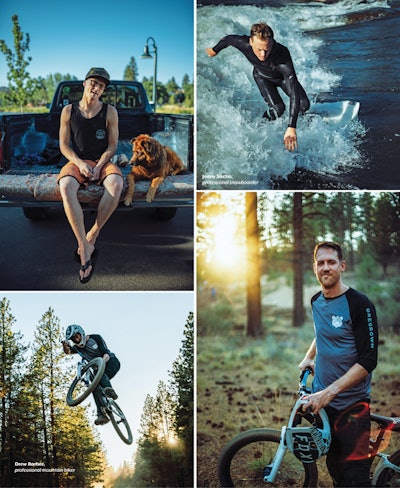
The Fine Print
Oregrown does ask its athletes to provide social media content and sport Oregrown’s logos. “I am contracted to wear the stickers on my board and helmet,” says snowboarder Marissa Krawczak. It is part of the symbiotic relationship Hadar has cultivated with the athletes. In exchange for content, Oregrown provides each athlete with a monthly stipend and an allotment for store products.
Additionally, “We’ll pay for some of their trips or contest entries. It allows them to do things that they may not be able to do on their own. We’re also helping promote them, so their careers can grow,” Hadar says. “We have a great camaraderie with all of our athletes.”
And the feeling is mutual. For proof, look to climber Ryan Palo. “The [Oregrown] folks I interact with really care,” he says. “This was obvious when I was injured last year. … Instead of being fearful my agreement would be terminated—as is customary in the climbing world—I was reassured and extended many sympathies.”
It is important to note, however, says Hadar, that Oregrown has “never posted a picture [to social media] of one our athletes using cannabis. That’s not what it’s about. We’re trying to destigmatize people’s perception of what the average cannabis user looks like and how they live their life.” Instead, the company’s Instagram is filled with images of the athletes prepping for a day of activity, carving up mountains or chilling after scaling a rock face.
“We’re not trying to get people to smoke weed through this program.” Hadar says, “It’s not about increasing sales. It’s about increasing awareness … because the people that use cannabis are not just your average stoner. They are lawyers, doctors, athletes, mothers and fathers.”
The Prep Work
If it sounds like implementing this program was easy for Hadar, think again. Although she had finance and retail experience prior to opening Oregrown, building an athlete ambassador program from scratch was a new challenge. “It really took a lot of time researching how to put together a successful program where the athlete benefits as well as the company,” Hadar explains.
There was also the issue of the athletes’ other sponsors. Would the sponsors be cool with their logo appearing next to a cannabis logo? Would being sponsored by a cannabis company jeopardize the athletes’ chances for future endorsements? Hadar clearly wasn’t looking to derail anyone’s career. “Some of our athletes are sponsored by big names, and there were discussions with some of those big brands regarding their relationship with Oregrown,” Hadar says, but “so far, so good.”
“I think people are starting to understand, through education and the acceptance of cannabis nationwide, that if used responsibly, it can be an asset to an athlete’s performance instead of a detriment,” Hadar says. (Note: Hadar does not view cannabis as a “performance-enhancing drug,” but rather—especially CBD—as a therapeutic alternative to opioids and pain killers to aid with injuries and recovery.)
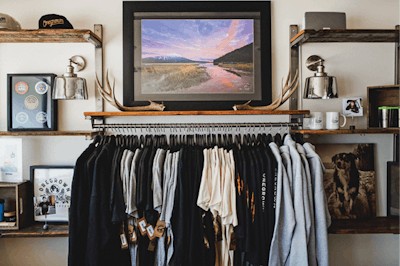
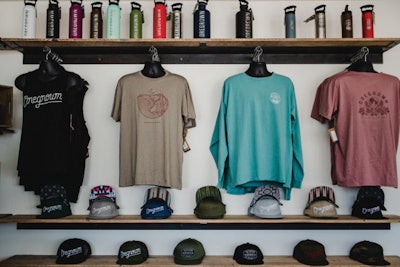
The Results
While the program’s intention was never simply to increase sales, Hadar admits that is has helped. “I can say that a lot of people are driven to our shop just by word-of-mouth from the athletes,” she says, adding that Oregrown has become one of the state’s top-selling dispensaries—partially because “we curate our offering for our customers, and we take the greatest care in doing that”—in a city with a population of less than 100,000.
Hadar is also quick to point out that while Oregrown’s focus is promoting a healthy lifestyle, its products are still top-notch. “I do believe that we produce some of the best products that come out of the state of Oregon. Our extracts are world-class,” she says. “We create dabbables that nobody else in the state has figured out how to make, including our caviar, our diamonds [and] nectar.”
However, Oregrown’s success ultimately boils down to its authenticity, which has resonated with customers. “We are just being ourselves. We all snowboard. We all ski. We have families,” Hadar says. “If you’re not yourself, people will feel it. If you’re trying to be something you’re not, it’s not going to be a successful program.”
The Future
Hadar dreams of taking the Oregrown brand national. Currently, all Oregrown-sponsored athletes participate in “extreme” sports—a nod to the area’s thriving outdoor culture. But as Oregrown expands, Hadar hopes to diversify its athlete sponsorships. “As we move into other markets, I can see us moving into more traditional sports like basketball or soccer,” Hadar says, adding, “As cannabis has been more widely accepted, we are in the process of attracting bigger-name athletes in other arenas.” (Although, that doesn’t mean they will stop supporting local athletes.) Perhaps she could give Michael Phelps a call.










